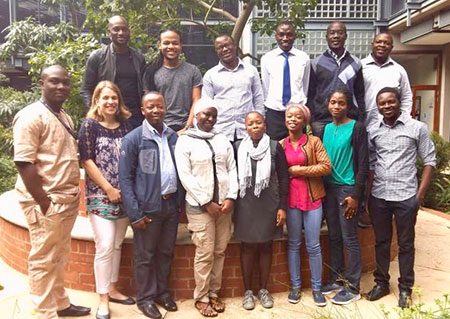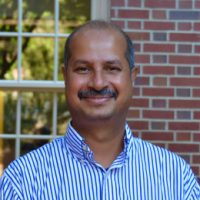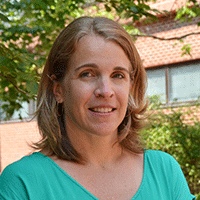Bringing implementation science to Africa
August 28, 2017
A longer version of this article, by Bradley Allf, originally appeared on the UNC Institute for Global Health and Infectious Diseases website. The longer article features several faculty members at the UNC Gillings School of Global Public Health, including Drs. Rohit Ramaswamy, Audrey Pettifor and Ilene Speizer.
Getting tested for malaria in rural parts of the globe used to mean sending off a sample of blood to a faraway lab and waiting days or weeks for results. Not anymore. Advances in the development of malaria Rapid Diagnostic Tests (mRDTs) mean that a person can be tested in 15 minutes, using a drop of blood and a plastic test packet that’s as easy to use as an at-home pregnancy test.
Yet in clinics in Ghana, health workers routinely ignore the mRDT results and treat all febrile patients with anti-malaria medication. Doing so wastes resources, exposes patients to needless antimicrobial treatment and can increase the prevalence of drug-resistant malaria.
This is a clear example of the type of problem that can be addressed by the emerging field of implementation science. Implementation science seeks to understand how research innovations can best be put into practice.
From Bench to Bedside
Implementation science is a rather new field that addresses an old question: How is research translated into practice?
“It’s a science that seeks to bridge the gap between what is known and how what is known is actually carried out in the field,” said Rohit Ramaswamy, PhD, clinical associate professor in the Gillings School of Global Public Health’s Public Health Leadership Program.
Ramaswamy leads an implementation science graduate program at UNC and teaches the core implementation science courses at Wits.
“[Implementation science] seeks to understand what the determinants are for poor implementation and what strategies you can employ to improve the quality of implementation in the field,” he said.
This can be as simple as addressing poor adherence in following hand washing best practices in a clinic – or as complicated as tackling the implementation of a multifaceted government health policy.
Ramaswamy is part of a team of researchers from the UNC Institute for Global Health and Infectious Diseases (IGHID) and the Gillings School. The team received a grant from the Fogarty International Center in 2014 to develop an implementation science degree program at Wits. The grant will help train researchers from the United States and around the world to strengthen global health research collaboration and improve the quality of HIV research in low- and middle-income countries.
South Africa currently has the highest number of people living with HIV in the world; nearly 20 percent of South African adults ages 15 to 49 are HIV-positive. Unfortunately, available resources are not always used efficiently. The new degree program at Wits could go a long way toward addressing this and other health inefficiencies in South Africa and throughout the region.
Crafting the program
The team worked with Wits faculty to develop the new degree program. Course structures, program length and other logistics had to be determined. Eventually, the program was approved by Wits as a concentration within the School of Public Health’s Epidemiology and Biostatistics Department. In 2015, it accepted its first cohort of students.
This cohort of 17 Master of Science trainees enrolled in January 2016. The program has blossomed into the most advanced implementation science program in Africa, with the first cohort due to graduate in December 2017.
Enrollment in the highly competitive program is open to postdoctoral and master’s students. Each course lasts two weeks, and the first week can be completed remotely. This allows for part-time enrollment – a necessity for many students – and enables non-enrolled health workers to take some courses as well.
“The short courses allow a bit more flexibility for government employees and people who need the training but can’t spend 18 months completing a degree,” said Audrey Pettifor, PhD, associate professor of epidemiology at the Gillings School and principal investigator for the grant.
Pettifor has more than 20 years’ experience working in South Africa, including at Wits. She appreciates that the grant allowed her team to create a training program that’s regionally focused.
“I think what’s really unique and special about this grant is that we’re really able to fund students from the region,” Pettifor said. “Most of the traditional Fogarty grants tend to fund U.S. students to go abroad. This was really unique because it funds the local students.”
Pettifor also values the collaborative nature of the program, saying the logistics of getting the program off the ground and through a number of “huge logistical hurdles” would not have been possible without the support and expertise of the faculty at Wits.
Real-world application

Master’s students in implementation science at The University of the Witwatersrand, in Johannesburg, South Africa, pose with Dr. Audrey Pettifor (front row, second from left).
For the master’s students, the 18-month program culminates in a six-month practicum. Through these projects, many of which focus on HIV/AIDS, students are able to apply classroom learning to develop an independent implementation science research project.
Michael Anaba, a graduate student from Ghana, is using skills he learned from the newly developed implementation science master’s degree program at Wits.
For his practicum, Anaba investigated the implementation of malaria rapid diagnostic tests (mRDT) in Ghana. His project already has proven useful to health workers, policy makers and program implementers in Ghana by outlining the current quality of mRDT implementation at Ghanaian health centers.
Anaba says his prior experience working in health care motivated him to pursue the implementation science degree.
“As a registered nurse in Ghana, I witnessed how new medicines, vaccines and diagnostic tools that have the capacity to lead to significant improvements in health outcomes have failed remarkably in the clinical setting,” he said.
With the tools he has developed at Wits, he now feels equipped to address some of those failings after graduation.
Looking to the Future
There are a number of goals for the new degree at Wits. First, the team wants to continue developing the self-sustaining capacity of the program. During its first year, UNC professors taught the implementation courses with Wits faculty partners. In the second year, those Wits partners began co-teaching the courses with the UNC faculty. Going forward, the local faculty will take on all the teaching.
“[It] has been sort of a transfer of skills from us to the Wits faculty,” says Ramaswamy.
In addition, the team wants to grow the program, which at this point only accepts 12 to 15 students per year. They also hope to develop the implementation science skills of the field supervisors who oversee some aspects of the students’ work.
The critical goal is to increase the involvement of the South African health ministries.
“The next step is to take this framework, and teach it to people in the government health sector so changes can be made in the programs that they oversee,” says Kathryn Salisbury, program manager. “Rather than wait for the graduates to get [ministry] jobs and then implement and make changes, we want to figure out how to make these changes on the ground right now with the people who are doing the work.”
Engaging with the government health ministries will allow for an even deeper local impact on health care in South Africa and the surrounding regions.
Closing the Gap
With the first cohort poised to graduate this year, Ramaswamy reflects on how all the work the team has done has come together to create a sustainable future for implementation science in Africa.
“What we want is these students who are graduating to become mentors for the next set of students,” he said. “It’s a fantastic opportunity to not just say ‘we’ve graduated a bunch of students’ but to say that these students are going to go back to their countries and will continue to be resources for the next set of students who come.”
Those relationships will be the starting point for what Ramaswamy sees as a large, sustainable network of implementation scientists across Africa.
Pettifor echoes his sentiments. “For me, having worked in South Africa for so many years, it’s really exciting to see a program that’s funding local students and providing resources to build capacity on the ground,” she said.
One study found that it takes an average of 17 years for new evidence-based findings to be adopted into clinical practice. The team from UNC and Wits believes that their work in starting the implementation science degree is a step toward closing that gap. Doing so will result in better health outcomes and a quicker transition from discovery to implementation.
Gillings School of Global Public Health contact: David Pesci, director of communications, (919) 962-2600 or dpesci@unc.edu


